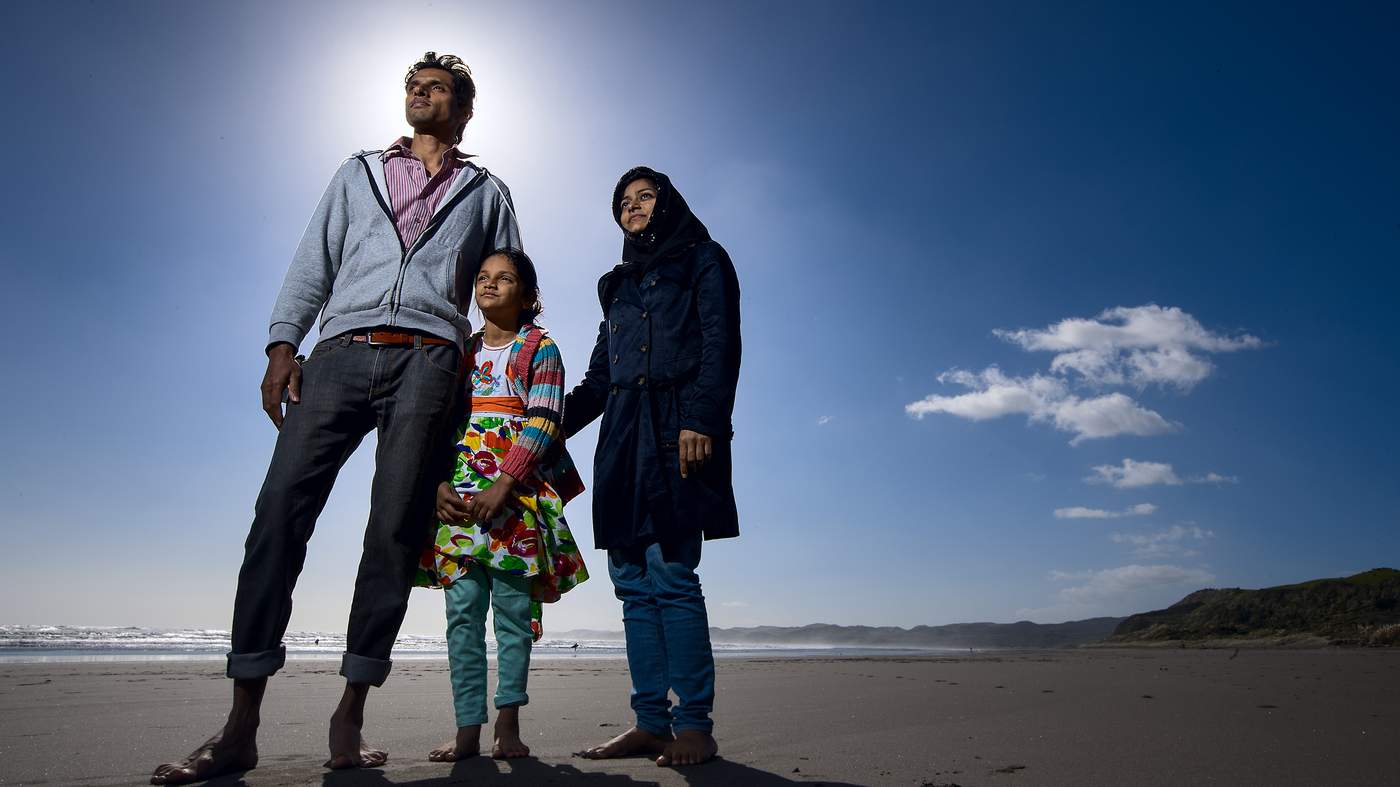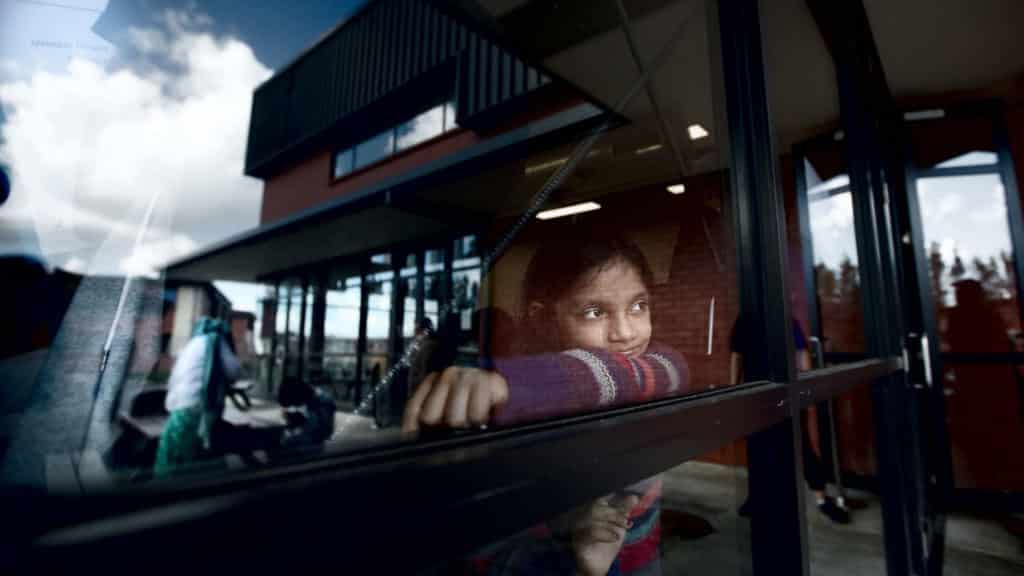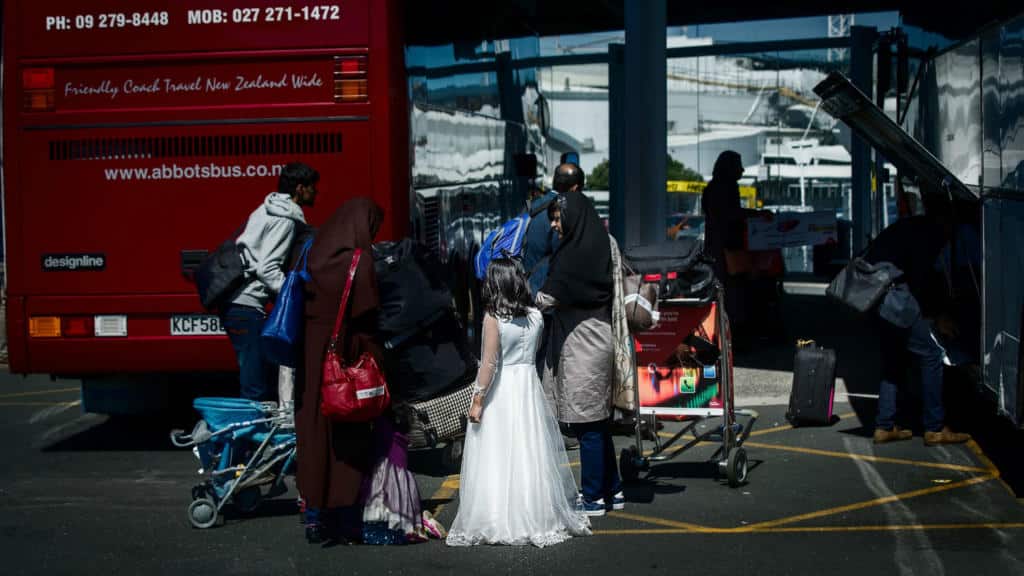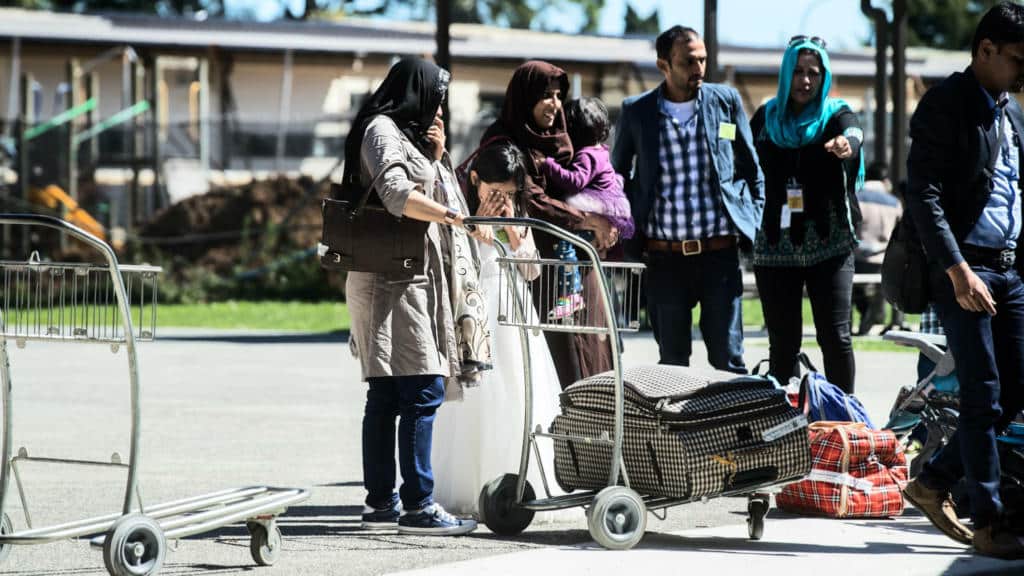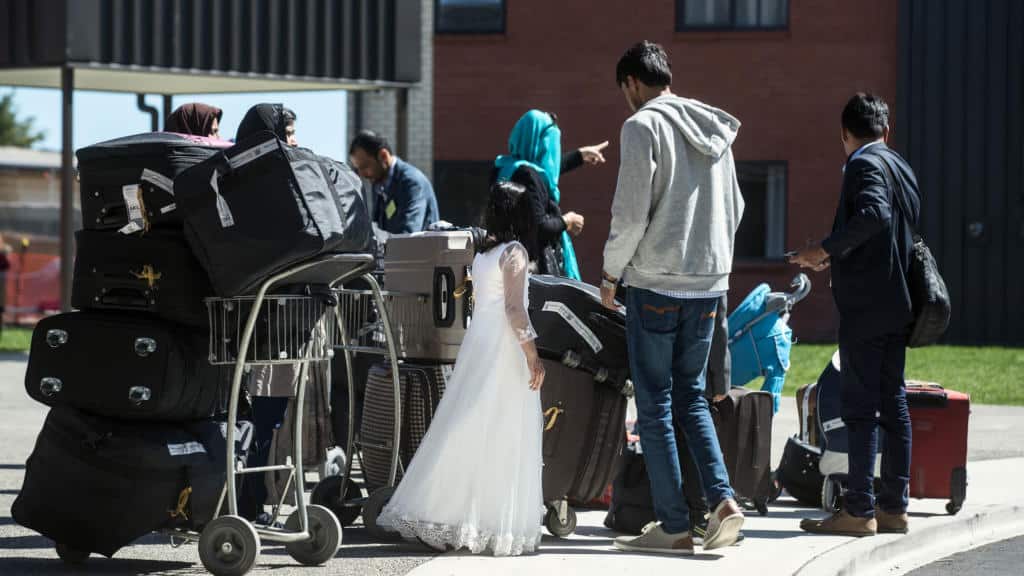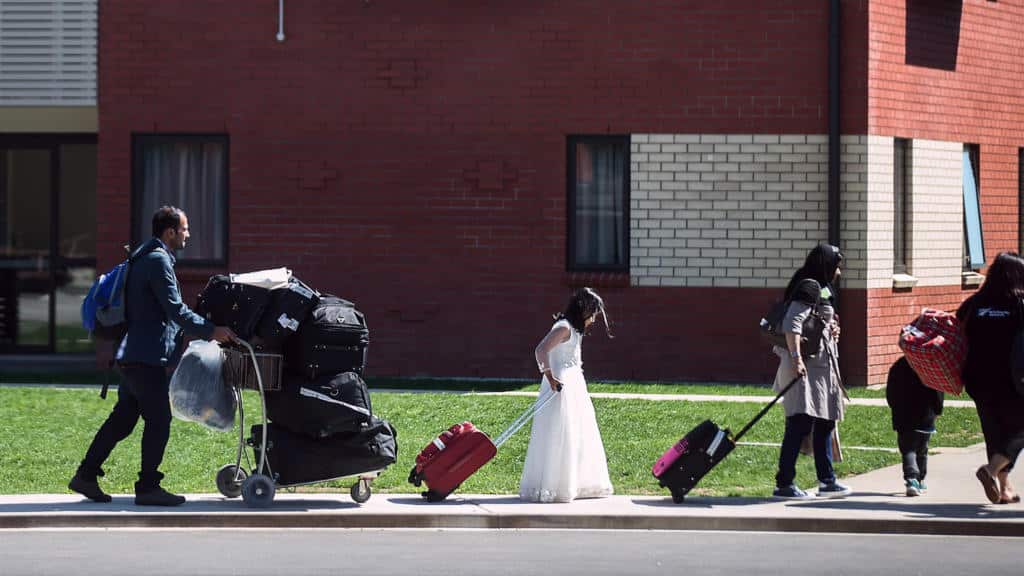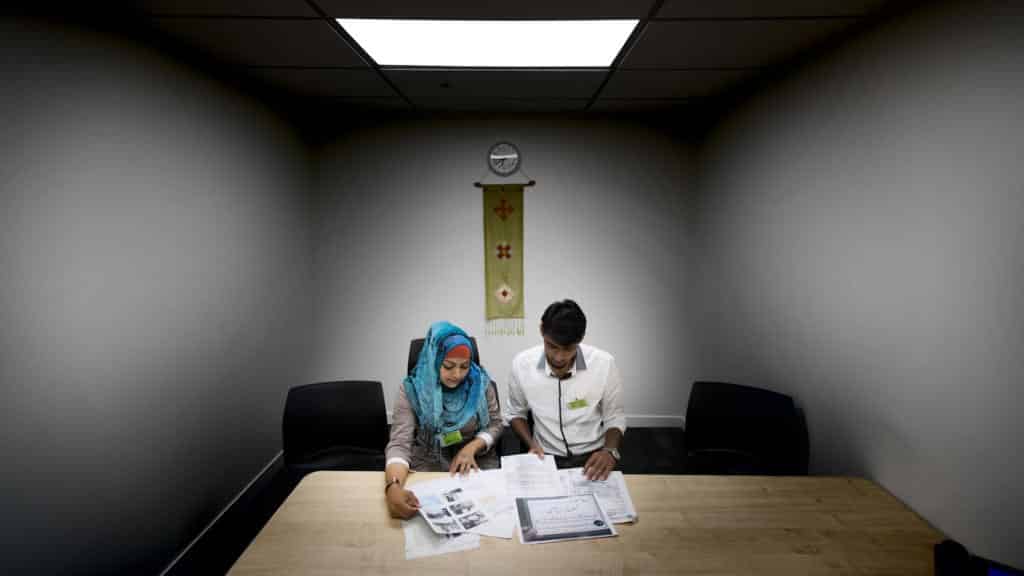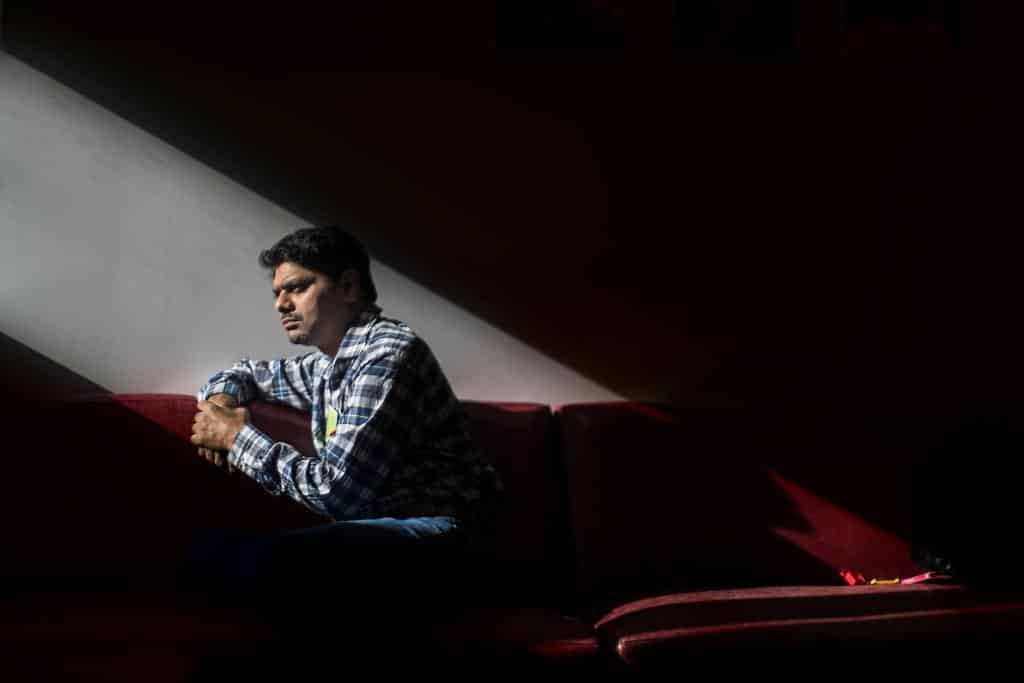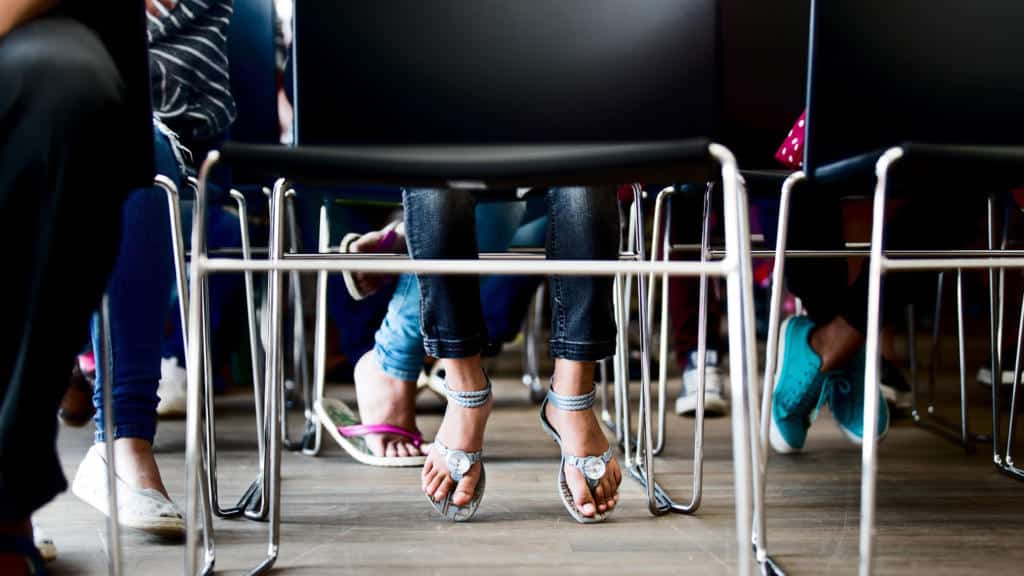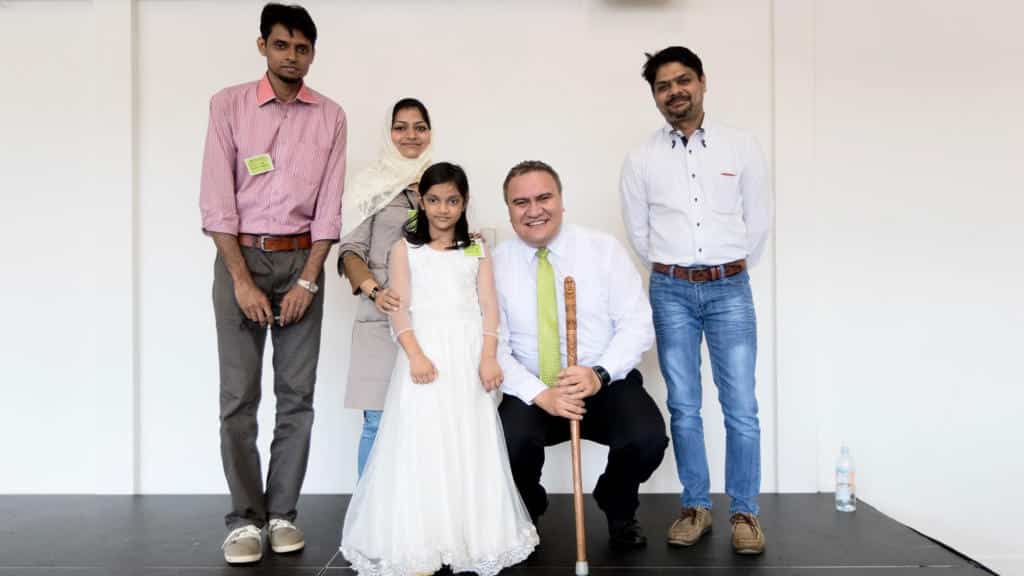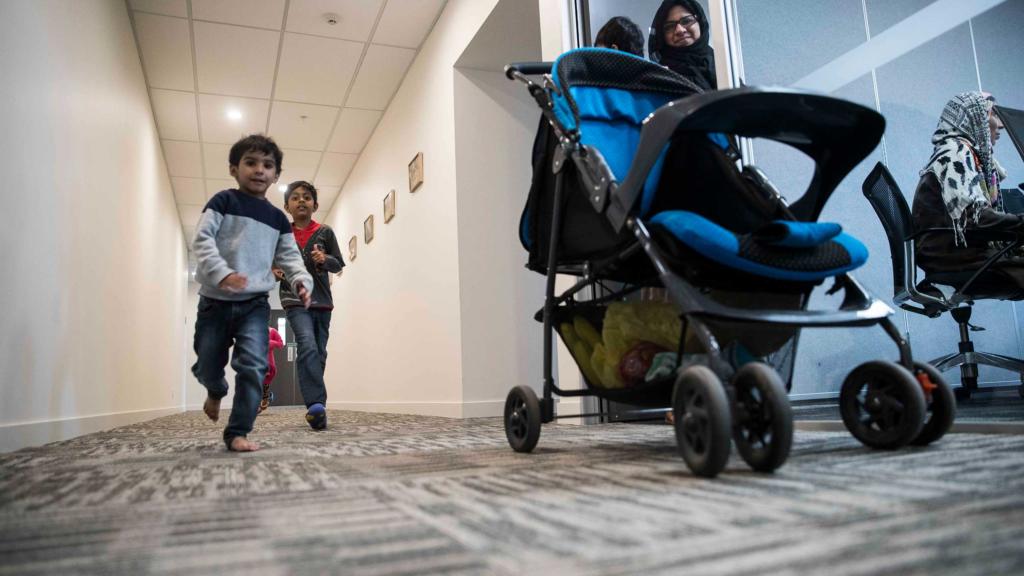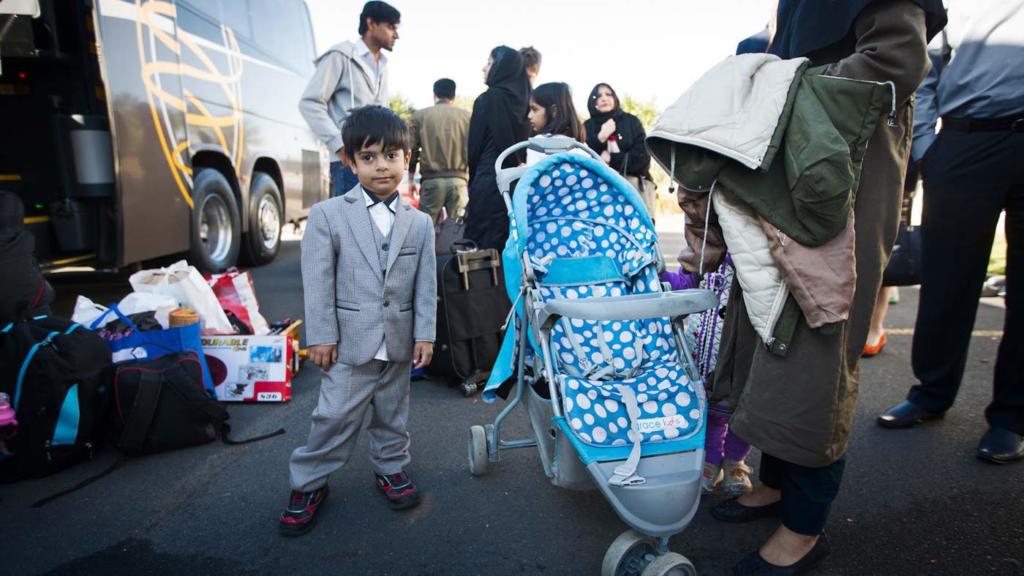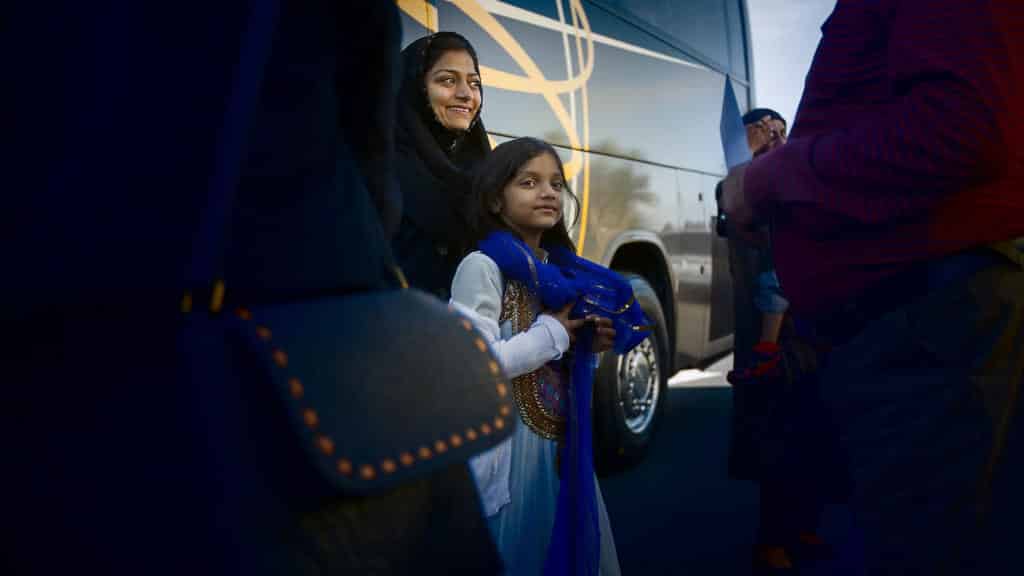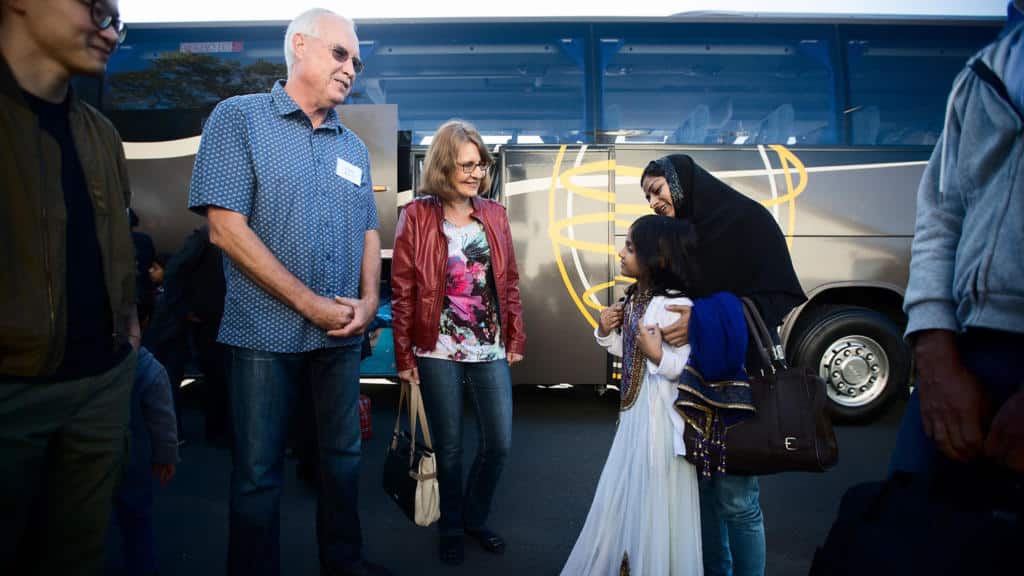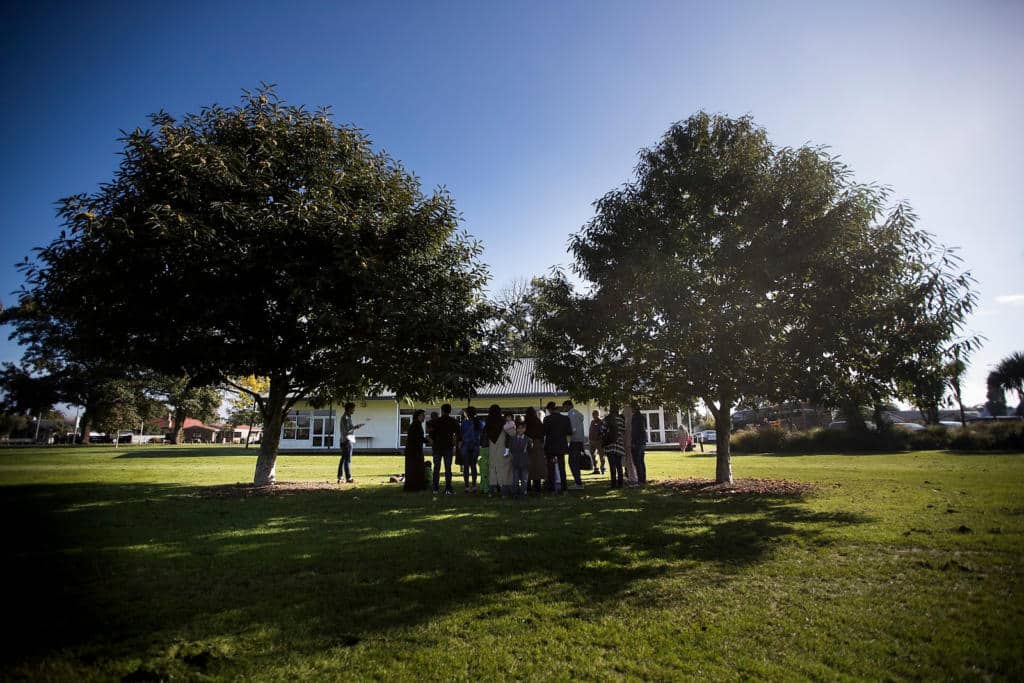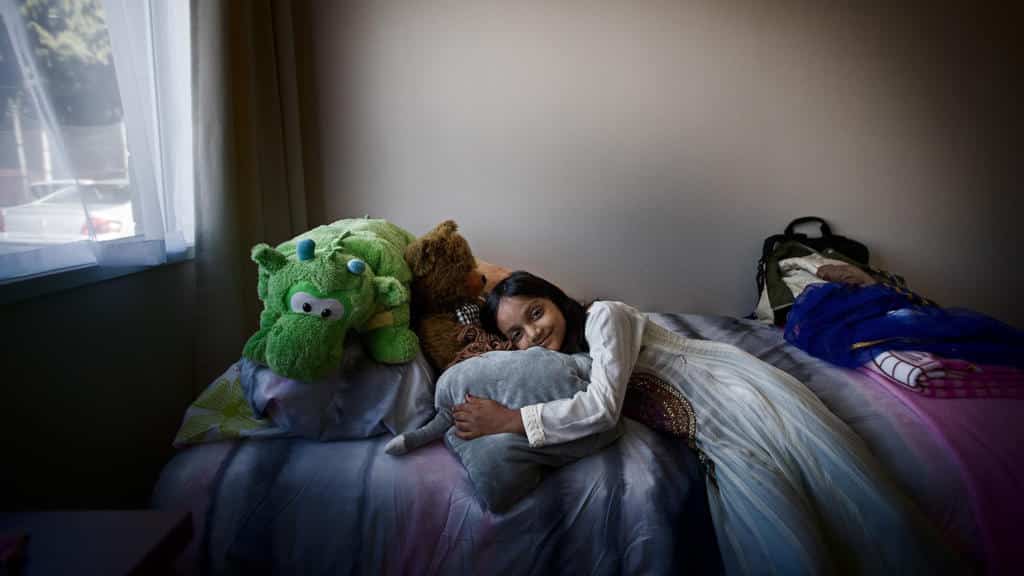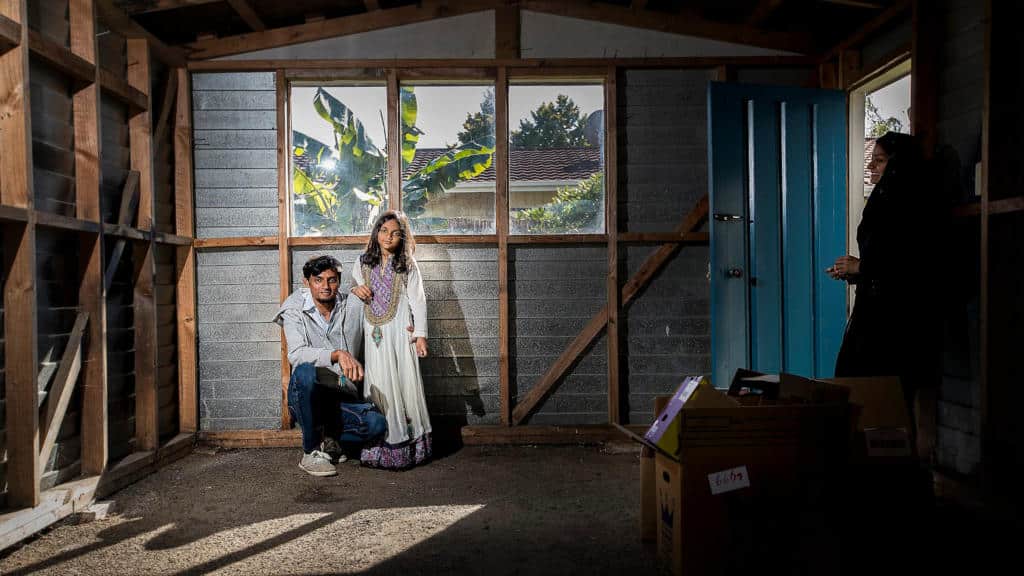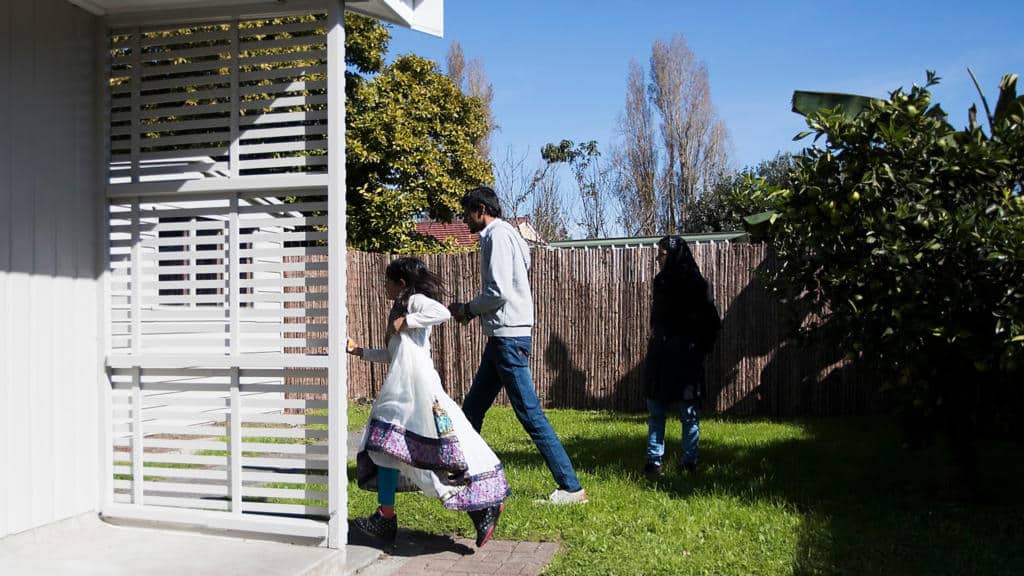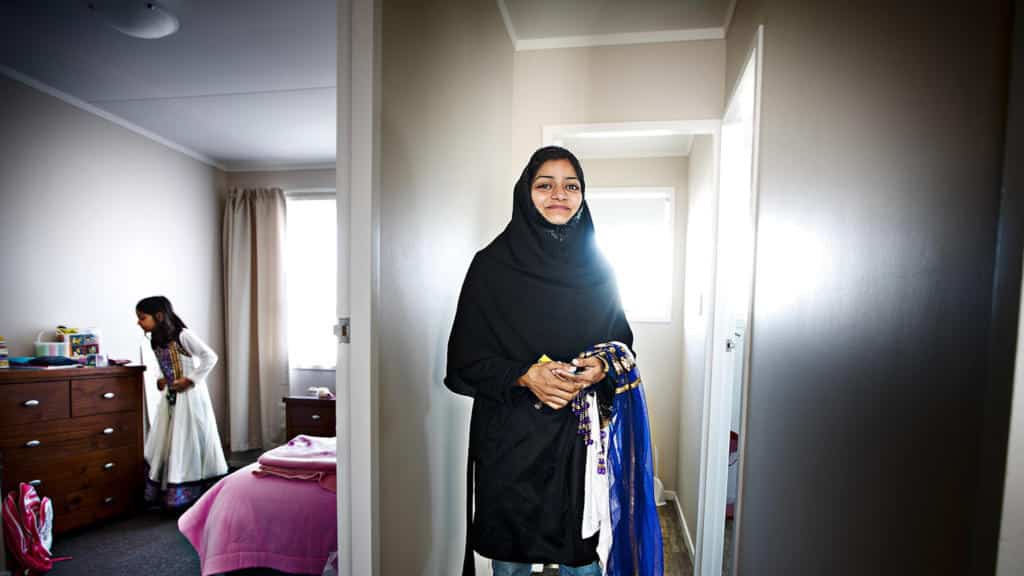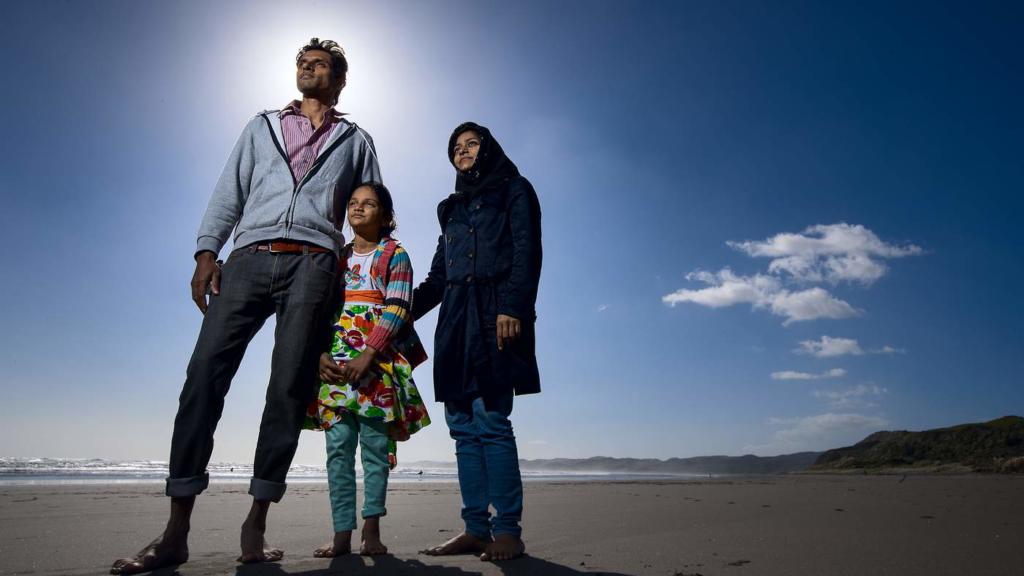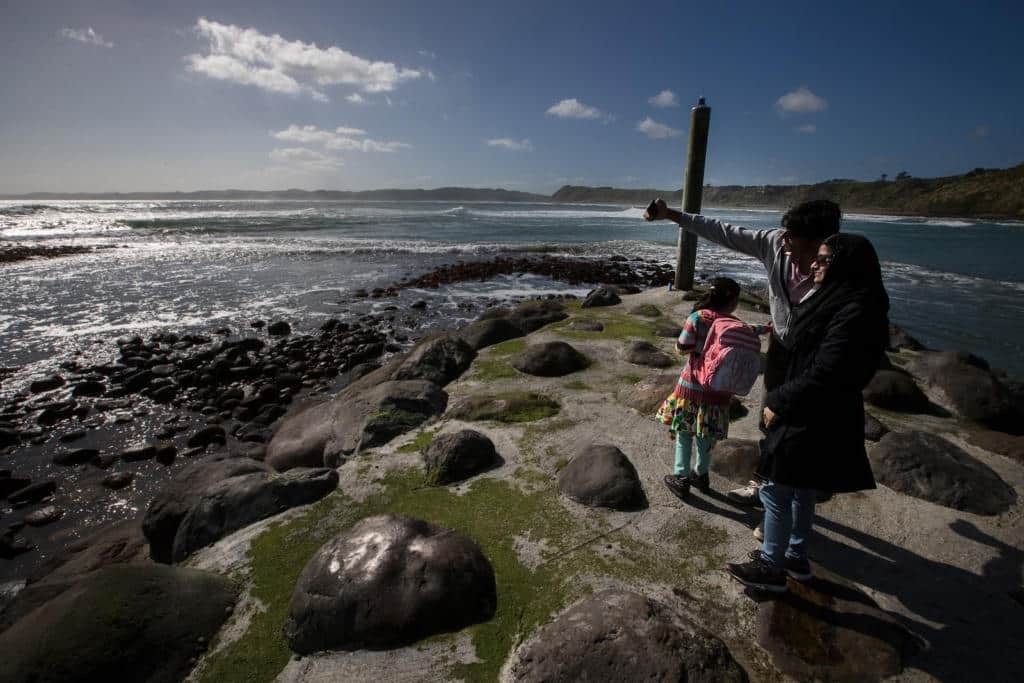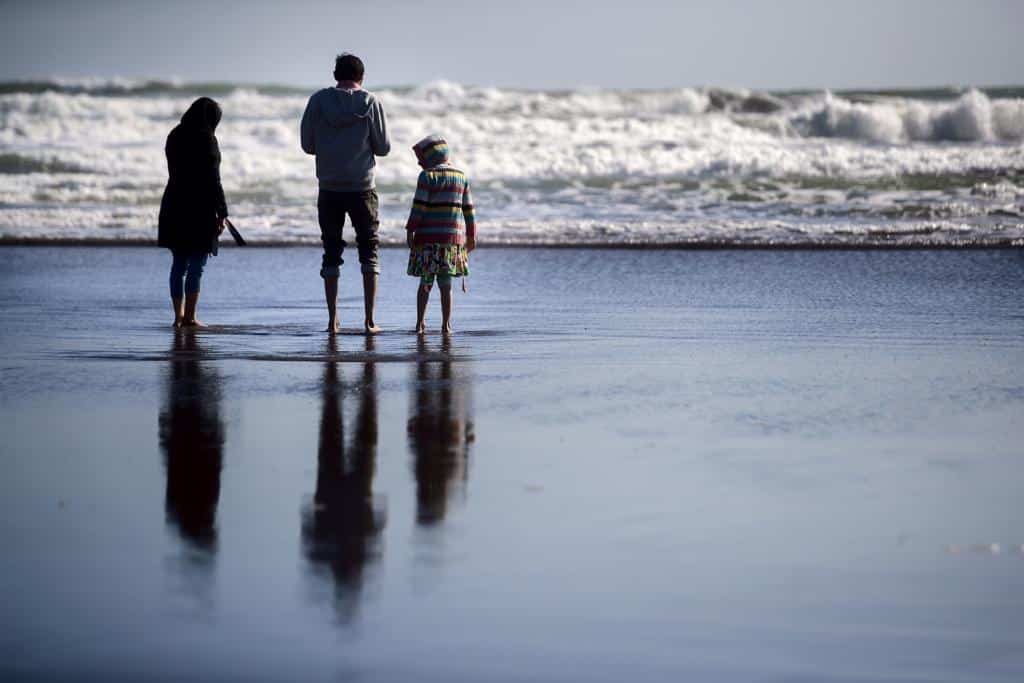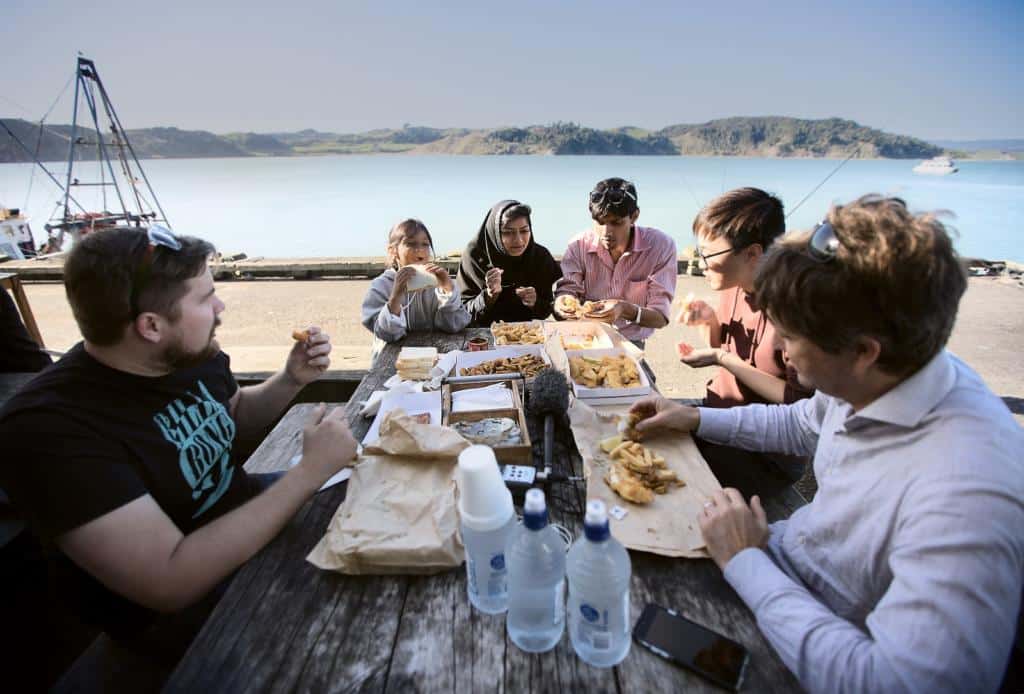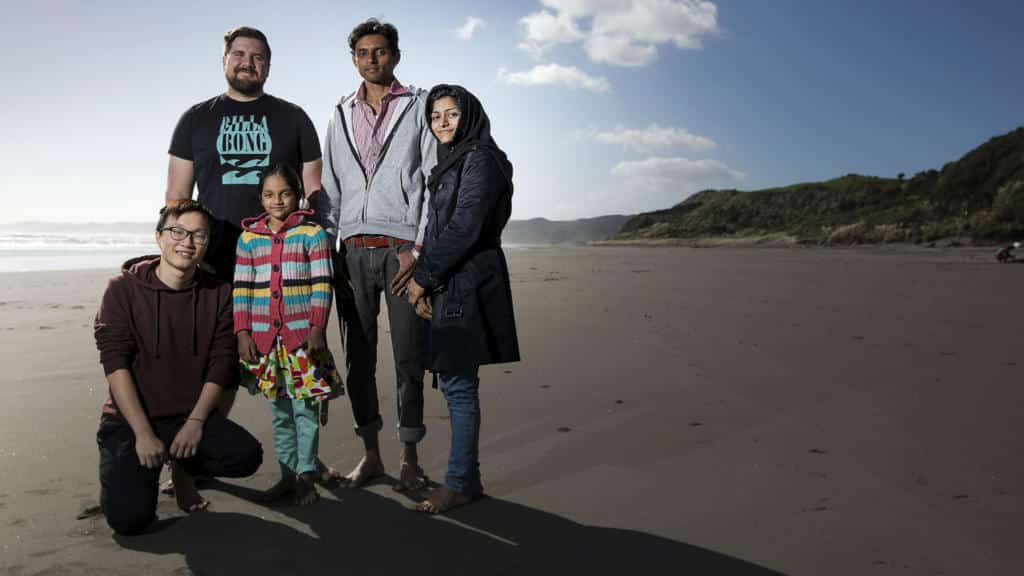Over three months, Stuff journalists Adam Dudding and Chris McKeen followed a family of Ahmadi refugees from Pakistan as they arrived in New Zealand and went through an immigration experience unlike any other in the world – a six-week assessment and support programme that is also a kind of crash-course in being a Kiwi.
Attia Tul Kafi is in the back seat, looking out at the rolling green hills. She’s six-and-a-half, though she’s so tall she could pass for eight, and isn’t in a carseat. She speaks only a little English, but enough to ask an important question.
“Are there tigers?”
Nope Attia, no tigers in the Waikato countryside. Nothing much dangerous around here at all really, apart from the occasional blind corner, or the powerful rip off the Raglan coast.
Attia’s mother Hibbah Al Hayee is in the front passenger seat. Attia’s father Salman Ahmad is in a car ahead, with volunteers Bevan Morgan and Chau Hoi Yuk.
It’s a trip to the Raglan coast, a dinkum slice of Kiwi life arranged by two of the four Hamilton locals who’ve signed up to help this family settle into their new New Zealand lives, with a reporter and photographer tagging along in the hope of some nice pictures on the beach.
The family has seen the ocean just once before, in the port city of Karachi on Pakistan’s southern coast, and in much less recreational circumstances. That was 2013, and they were in Karachi only because they were waiting for permission to board a plane for a “holiday” to Thailand, after being hounded from their homes in the north by religious fundamentalists who threatened to kill them.
Near Ngarunui Beach, the dry hills and scrubby vegetation remind Hibbah a little of Peshawar, near the capital Islamabad. Here it’s “bush”, there it’s “jungle”, but it looks much the same. And in fact there are no tigers in either. The last wild tiger in Pakistan was shot in 1906, back when it was still part of India.
In the weeks since their arrival, Hibbah and Salman have described the tribulations of the past decade: systematic harassment and threats, officials turning a blind eye, careers destroyed, a near-miss in a bloody gun massacre, fleeing the country you love and ending up in one you’d barely heard of.
Things are looking better now than they have for a long time, but the couple see the scale of what still lies ahead. Their English isn’t great; their qualifications may not count here; they’ll depend on benefits till they find jobs. They’re determined to repay the family loans that kept them going during years of refugee limbo in Bangkok, and money is very tight.
Hibbah is grateful for having such a beautifully-behaved daughter. In Thailand they had to be very strict, and make sure Attia kept quiet. The last thing you want to do when you’re an illegal and liable for arrest at any time is to annoy your neighbours.
Sometimes Attia would ask for a nice thing or a treat, but she learnt not to make too much fuss when Hibbah’s answer was, once again, “no”.
And sometimes, says Hibbah, half-turning in her seat to look at her daughter in the back seat, she wasn’t sure how she should answer her questions.
“She’d ask me – ‘Mum. Are we poor? Are we?’”
On a sunny Wednesday, seven weeks before the Raglan day trip, Thai Airways flight 491 from Bangkok landed at Auckland International Airport just after midday. Three Pakistani families, six adults and six children, were met off the plane by a representative of the Mangere Refugee Resettlement Centre and shepherded through immigration and customs – it’d be a shame to start your new life with a huge fine for bringing in an undeclared apple.
The adults pushed luggage-stacked trolleys and a pram through the arrivals hall, orbited by children dressed to the nines. Attia was in a long white satin dress, and two of the boys wore miniature three-piece suits. A younger girl had a firm grip of her mother’s long brown robes.
Once stacked on the footpath, the worldly possessions of a dozen people didn’t look like much, and it didn’t take long for the pot-bellied driver with a bluetooth earpiece to load the luggage compartment of the chartered bus. Hibbah was feeling happy, if a little overwhelmed. The sign on the rear of the bus said: “We hope you will love New Zealand as much as we do”.
At the newly rebuilt refugee centre 15 minutes drive away, a group of children was trying unsuccessfully to persuade the man behind the reception desk to lend them another ball for their game, and multi-ethnic groups of teenagers were soaking up some lunchtime sun.
The bus parked in front of the handsome new administration block and the families were shown to their rooms in one of the two-storey accommodation blocks overlooking a grassy quad, and left to their jetlag and unpacking.
Once the full complement of 168 refugees from 12 countries had arrived (vagaries of visas and flights mean arrivals trickle in over a week or more), they moved through the programme together before dispersing to final destinations that included Dunedin, Nelson, Wellington, Manawatu, Waikato and Auckland. The process is repeated with subsequent cohorts to resettle around 1000 refugees each year.
There are around 22.5 million refugees worldwide, and though 55 per cent of them have been displaced by catastrophic conflicts in just three countries – Syria, Afghanistan and South Sudan – significant numbers come from dozens of other countries.
Immigration New Zealand, Red Cross, health providers, social agencies and refugee charities all play their part, and Auckland University of Technology (AUT) delivers the education programmes.
During their time at the centre, and then the first few weeks after their resettlement in Hamilton, we followed Hibbah, Salman and Attia as they learnt the ways of New Zealanders: how to go to school and talk to police, how to navigate a hongi and discipline a naughty child.
They were shown how to get an IRD number and sit a driving theory test; the best way to talk to impress your employer; where to buy a fridge and how to sing Tutira Mai Nga Iwi; how to collect a benefit and where to find the right mosque.
Some lessons seem so obvious as to be patronising, but they didn’t mind being taught how to suck eggs, and there were some New Zealand customs Hibbah found genuinely baffling. Why, after all, would anyone want to “bring a plate”?
A couple of weeks into the programme, in an interview room at the Mangere Refugee Resettlement Centre, Salman and Hibbah explained, with some help from Auckland Urdu interpreter Arshid Jamil, why they fled Pakistan.
The couple are from Nankana Sahib, in the Punjab province in the north of Pakistan. Like many Pakistani couples, they are cousins, and married in 2008. Hibbah, 35, is a teacher of clothing design and dressmaking, which explains why each time we meet, her daugher is wearing a different, spectacular tailormade dress. Salman, 33, is an industrial electrician.
Their troubles are religious. They are Ahmadis (or Ahmadiyya) – followers of a Muslim sect founded in the Punjab in the 1880s by Mirza Ghulam Ahmad, who considered himself the Messiah prophesied by Muhammad.
Though the vast majority of Ahmadi beliefs and practices are identical to those of other Muslims, the differences are enough that followers have long faced discrimination from some mainstream Muslims. There are now 10-20 million Ahmadis around the world, with the largest group – possibly as many as four million – living in Pakistan, and that is where the discrimination against them is the most acute.
Following anti-Ahmadi riots in 1974, Pakistan’s constitution redefined “Muslim” so as to explicitly exclude Ahmadis. In 1984 then-president General Zia passed a law making it a criminal offence for Ahmadis to “pose as Muslims”.
Thus Ahmadis are technically breaking the law and face up to three years in jail if they have the temerity to publicly quote from their holy book, the Koran, or perform a Muslim call to prayer, or refer to their mosque as a “mosque”, or even, astonishingly, use the Islamic greeting “as-salaam-alaikum”.
In other words, if you are an Ahmadi in Pakistan, you can basically go to jail for saying hello.
To hear Hibbah and Salman, and the two other Ahmadi refugee families, talk about the years before they fled was to be powerfully reminded of stories you read about the lives of Jews in the early years of Nazi Germany: ordinary folk living ordinary lives that gradually became less and less tenable at the hands of rabble-rousing bigots and acquiescent officials, all against a backdrop of intermittent extreme violence. A 2015 Ahmadi-authored report estimated 250 Ahmadis had been killed for their religious beliefs since 1984.
Hibbah said Ahmadis in Pakistan don’t look, dress or act especially different from anyone else, but anti-Ahmadi activists would follow them from their mosques or community events, in order to identify and then publicly humiliate them. At the vocational college where she taught design, the religious group Tehreek-e-Khatme Nabuwwat posted anti-Ahmadi posters in her classroom, and organised a student strike demanding that she be fired. In 2011 school administrators transferred her to a school 80km to the north, but the victimisation followed her, and she was transferred another two times.
“Wherever I went,” said Hibbah (in Urdu), “people were told, ‘Look, she’s a non-Muslim, and you cannot communicate with her.’ It got to the point where even if I wanted to travel in a rickshaw they wouldn’t let me sit in it. They would abuse me and say if you don’t leave the college, we will kill you.”
Salman faced similar alienation by his work-mates – “you can’t sit with us; you can’t associate with us” – but the final straw for them both came one evening in early 2013, not long after someone had warned the couple that they were on an extremist hit list.
Salman was waiting to meet Hibbah off her bus journey from work, when he was attacked by four men carrying sticks. He escaped on his motorbike and rang Hibbah to tell her to stay on the bus until a later stop, and late that night the family fled to Hibbah’s parents’ house in Lahore. Even there, though, they didn’t feel safe. The time had come to leave forever.
Thailand isn’t a great place to be a refugee – it’s not a signatory to the 1951 Convention on Refugee Rights, so refugees are treated as illegal immigrants even if their applications for resettlement are being processed by the United Nations – but it’s relatively easy for Pakistanis to get tourist visas there, so Bangkok is where they ran to first. There was a delay after an official in Lahore refused to give a visa to Ahmadis, but in Karachi they got lucky. Ten weeks after the bus-stop beating they were on a flight to Bangkok.
It’s a mark, perhaps, of how reluctant they were to leave Pakistan that they hadn’t already done so three years earlier. In May 2010, Salman was at Friday prayers at the Ahmadi Bait-al Noor mosque in Lahore when two grenade-wielding gunmen from the Pakistan Taliban (not to be confused with the Afghan Taliban) killed 27 worshippers and wounded many more (a simultaneous attack on another Ahmadi mosque in the city killed 60). For 40 minutes Salman lay on the floor as bullets flew overhead.
“The bullets would strike the concrete pillars in the mosque and ricochet,” said Hibbah, “but because he was so thin the bullets managed to miss him.”
Salman is, indeed, extremely thin, but Hibbah was of course just kidding. She has a knack for finding the darkly comic moments within their grim story, and a laugh is never far away. In her teens she was a regional cycling champ, and she competed in numerous athletic events at an all-Pakistan games in Lahore.
She often gently teases her husband, and you get the feeling that even if she weren’t the stronger speaker of English, she’d still be the one leading the conversation. Theirs was an arranged marriage, and Hibbah thinks their families chose well.
“He is a good husband. Very cooperative, and he gives me freedom. I can do everything.”
It was a long and difficult three-and-a-half years in Thailand. Salman and Hibbah couldn’t legally work, and Attia couldn’t attend school. Hibbah had two miscarriages. They were liable to be arrested and detained at any time, and Attia developed a terrible fear of police.
The two other families who arrived on the same flight from Bangkok have their own stories. Sarfraz Ahmad – who is Hibbah’s brother – was in the other Lahore mosque that was attacked that day in 2010 and has five bullet-wounds to prove it. His family followed Hibbah’s to Bangkok in 2014, and while they were there his daughter died of a medical condition.
Imran Ahmad (no relation – “Ahmad” is a religious signifier rather than a last name in the Western sense) had a hardware store in the Ahmadi-majority and thus relatively safe city of Rabwah, but his business was ruined when Lahore wholesalers refused to sell stock to him as an Ahmadi. In Bangkok, his wife Mansoora and their daughter were caught in a police round-up and spent the last three months before leaving for New Zealand in a detention centre. During that time Imran’s elderly mother, who had been nursed by Mansoora, died.
Hibbah and Salman didn’t mind where they ended up – they just wanted out – but last year, they finally learnt they would be going to New Zealand. They knew nothing about the place, but with the help of Google they started researching their future home.
Two weeks in, they still hadn’t seen much beyond the refugee centre, but they had attended prayers at a nearby Ahmadi mosque. Hibbah was still adjusting to the idea of being in a place where they didn’t face discrimination.
“They’ve told us no one is going to bother you here about your religion or your culture, because there are so many cultures here – something like 160.”
But a few minutes later, as the photographer was discussing where to take a portrait of the family, Sarfraz bustled to the door waving his smartphone.
News had just come through from associates in Pakistan: Malik Saleem Latif, the local leader of Ahmadis in Nankana Sahib, had been murdered – shot off the pillion seat of his son’s motorcycle as they rode to work.
Salman and Hibbah inspected their phones, and anxiously conferred with Sarfraz.
Six years after Hibbah was first hounded out of a teaching job, and four years after they’d fled the country altogether, another hate crime in Nankana Sahib had reached 12,000km, to a small room in Auckland, to remind her that this wasn’t over yet.
On the morning of Friday March 31, a smiley, shaggy-haired police officer paced a stage at Mangere’s Refugee Resettlement Centre. He spoke in short, simple sentences, and whenever he reached a full-stop he’d wait as his words were simultaneously yelled in Nepali, Spanish, Rohingya, Farsi, Urdu and Arabic by the interpreters scattered through the audience of 150 or so refugees.
The blasts of multilingual white noise seem truly bizarre at first, but you get used to them. They were an unavoidable feature of every communal event at the centre, from the powhiri in week one to the graduation in week six. Usually a few crying babies and talkative toddlers added to the racket.
The cop on the stage was ethnic liaison officer Rob Stanton, and he had the smooth, Dad-joke patter of a tourist-bus driver. This is my Taser, he said, “and if I see anyone falling asleep it will help to wake you up!” He demonstrated how a baton makes a perfect backscratcher.
But seriously folks, his was a genuinely useful introduction to crime and punishment, New Zealand-style. He advised against trying to bribe Kiwi cops because they’re not very corrupt. He said police aren’t allowed to search your home without good cause, and you can complain about an officer without fearing reprisal. He said a Muslim woman will never be asked by police to remove her hijab unless it’s in private and with a female officer. Oh and by the way, we’re keen to recruit ethnic minorities, so please pick up an application form as you leave.
It was a kind of propaganda, but it was also strangely moving to see, just for a moment, how New Zealand might look through the eyes of new arrivals from countries where those things don’t always apply.
Stanton then explained, with some delicacy, certain other laws. Domestic violence in New Zealand is a serious problem, he said, so police will take it extremely seriously if you hit, threaten or try to psychologically control a family member.
Also: “It’s illegal to use physical violence to discipline your children”.
Once the sentence was translated, the auditorium was in uproar.
An Afghan interpreter translated the question on everyone’s lips: “If my children hear this, will they call the police on me and cause a lot of trouble?”
Sure, we’ll take a complaint seriously, said Stanton, but don’t worry – we don’t go around arresting parents for nothing. He added the usual talking points about how it’s OK to yank a child out of a fire or the path of a speeding car, but it was clear some parents were going to need a bit more explanation of how on earth you bring up a child without being allowed to hit them.
The following Monday, during an adult class about New Zealand’s education and qualification systems, AUT teacher Penny Hickey answered questions from anxious parents.
“My biggest concern,” said one mother via an interpreter, “is about my children. I can’t control them.”
Specifically, her son had threatened to call the police if she didn’t immediately buy him an iPad. The room roared with laughter, and Hickey nodded approvingly.
“I’m very pleased the reaction is laughter, because you realise how ridiculous that child’s comment is.”
She had a tip: “Perhaps say to your child, ‘That’s fine. Why don’t you go to the police?’”
Hickey took the adults on a tour of AUT’s children’s classrooms, which are set up to resemble ordinary Kiwi schools, except with a teacher-pupil ratio that would make Hekia Parata weep.
In the secondary class, 11 teenagers were doing a scavenger hunt for pictures of animals. The intermediate class was doing something geometrical involving iPads. In the juniors classroom 20 children sat on the mat as three teachers helped them identify objects starting with the letter “R”.
“This sport is very important in New Zealand,” said the male teacher, holding up a picture of an oval object. “Rrrrr…?”
“Ball!” a child shouted.
“Rrrrrrrrrruu…?” said the teacher.
Silence from the mat.
“Rrrrrrrrrugby!” said the teacher.
“Rugby!” shouted the children, successfully indoctrinated in so-called New Zealand culture.
The teaching style seemed very different from back in Pakistan, said Hibbah, who’d been watching Attia on the mat. It was much less strict. It looked like much more fun.
Hibbah said didn’t feel patronised when offered advice like “don’t bribe police” or “don’t hit your children”. The people at Mangere were just teaching us “good values”, she said later. In any case, Attia was such a sensitive child she and Salman had never hit her; a stern word was enough to make her cry.
As for being informed that men and women have equal rights in New Zealand, “we haven’t learnt anything new here. In Islam, women and men have equal rights too.”
During a speech in the first week, an Immigration New Zealand official told all the refugees: “Welcome – but don’t forget where you come from. Keep your identity, keep your culture and share it with us.”
That resonated for Hibbah and Salman.
“All the good values that New Zealand has, we will adopt,” said Salman, “but we want to live our lives according to Islamic teachings as well”.
They worried that Attia would one day want to dress in a more Western, less modest way, simply because she’d be growing up in this culture.
Then again, said Hibbah, it should be OK because “Attia doesn’t like all these short clothes. She will just copy me.”
Other New Zealand customs seemed weird but harmless, such as asking guests to “bring a plate”. In Pakistan, guests are always a blessing of God, said Hibbah, so you want to do the best for them, not ask them to bring the meal.
At a meeting of all the Hamilton-bound refugees, Hibbah offered to be the person who responded during the powhiri, and was startled to learn that according to Maori custom, only a man could respond, and that women would also have to sit at the back.
That’s OK, she said with a gracious smile. “That’s their culture. In Islam women are equal, but we respect this culture too.”
The last formal event at Mangere, the day before the 168 refugees boarded busses and planes to their final New Zealand destinations, was a graduation ceremony. There were songs and speeches, and country by country, refugees walked across the stage to receive papers confirming their status as New Zealand citizens.
It was celebratory, but there were awkward moments. Hibbah’s brother Sarfraz, speaking on behalf of the 12 Pakistanis, thanked all the Mangere agencies and officials then spoke at length about oppression of Ahmadi by mainstream Muslims in Pakistan. The longer his speech went on, the louder the rumbling grew from a group of Syrian refugees in the audience. Eventually one of the Syrian men stood and stalked from the room.
Later, a staff member quietly pointed out a South American man who’d been having an especially rough day: he’d recently learnt that a close relative had been murdered back at home.
Shortly after 9am the next morning, a Friday, a bus carrying Pakistani, Afghan and Colombian refugees pulled up outside Hamilton’s refugee settlement centre.
The waiting crowd in the carpark included Red Cross officials, members of Hamilton’s minuscule Ahmadi community, an MP, local iwi, and a small army of Red Cross volunteers: locals who’d signed up to help smooth each family’s integration into Hamilton life over the coming six to 12 months.
Hibbah and Salman had been assigned four volunteers. Frouke and Chris Nicholson, a middle-aged couple who once spent years in Niger with a Christian organisation, had helped refugee families before, but youth worker Bevan Morgan, 32, and university student Chau Hoi Yuk, 22, were first-timers.
Morgan’s T-shirt bore one of the alternative New Zealand flag designs that didn’t make the cut in the 2015 referendum: the kiwi with laser eyes. A history graduate, he’d approached Red Cross because he was finding the state of world affairs depressing and wanted to do something positive in response.
Chau, two years into a biology and psychology degree, had been browsing volunteer opportunities for the sake of his CV, and this one jumped out.
“You see all the news saying Muslim people are kind of terrible, that they’re all terrorists, and people just believe it without trying to talk to them, and understand they’re actually living a normal life.
“I told my mum I wanted to do this refugee stuff and she said, ‘You need to be careful’. I guess she had the mentality that if it’s dangerous there, they bring danger with them.”
In a preparatory course, the volunteers learnt about the horrors refugees have typically faced. They were told what kinds of assistance are truly useful (showing a family how to navigate public transport; helping with school enrolment; simply befriending them) and what isn’t (supporting them financially; acting as an ongoing taxi service).
They were also warned not to assume helping people would always be easy, or that the refugees would be infinitely grateful. These people have lived through deep trauma, said Morgan, “so you have to be prepared that they might struggle, and that they might not be as ecstatic as you hope”. He didn’t want to fall into the trap of being a “white saviour”.
The powhiri was long, especially after five-way translation. Hibbah’s brother Sarfraz responded on behalf of the refugees, then everyone lined up for the hongi (though the Muslim women exchanged polite nods with men instead of nose-presses). Then, finally, volunteers loaded their cars with people and luggage. After six weeks in New Zealand, this was the bit everyone had been waiting for.
To New Zealand eyes, Salman and Hibbah’s two-bedroom rental in Hamilton East was tidy but modest: galley kitchen; small sitting room with two sofas and a square kitchen table; new paint and carpets; a strip of lawn (long enough to play cricket, Morgan pointed out); a one-car metal garage. Most of the furniture, and all the toys and books in Attia’s bedroom, were hand-me-downs or gifts arranged by the volunteers.
Frouke apologised that one of the sofas was a bit huckery.
“It’s your house, so if you want to change anything, just do what you like.”
“No hard feelings if you want to throw that one away,” Morgan added.
Chau apologised too: he’d forgotten to bring Blu-Tack for putting up pictures.
Salman and Hibbah didn’t know what the volunteers were on about.
The house seemed big and well-equipped. In Pakistan they’d not had a hot-water cylinder and simply heated water on the stove. In Pakistan they’d had no sitting room: they’d eaten and hung out in the same room where the entire family slept.
“It’s lovely,” said Hibbah. “It’s amazing. I like it very much. Everything is good and fine.”
She couldn’t stop smiling.
“Do you like my new home?” she asked the world in general.
The following morning, Chris and Frouke took the family for their first New Zealand shopping expedition: Pak’nSave for basics, a halal butcher for some cheap cuts of goat, an Indian store for herbs and spices, and a two-dollar store for a small watering can for the loo – like much of the planet’s population, people in Pakistan use water rather than toilet paper, and New Zealand plumbing is seldom set up to suit.
The first three items on Hibbah’s shopping list were سرخ مرچ, ہلدی, and پتی: red chili, turmeric and tea. They had just $180 to buy everything they needed, including cupboard basics like flour, sugar, salt and oil, so the trip was an epic exercise in painstaking price comparison, but kind of fun all the same.
Frouke pointed out the best deals at Pak’nSave, and Hibbah kept track with a calculator. Salman fetched and carried, and ventured occasional opinions about the best brand of wholemeal flour or brown sugar, but Hibbah was in charge, ready to take control of the family’s diet for the first time in months.
She passed the ready-made flatbreads and roti without slowing; she’d be making her own, thank you very much. She grabbed a litre of plain yogurt from a fridge, but only because she was going to use it as the starter culture and make her own.
Across town, at Khyber Food and Spices, she was in heaven, filling her basket with mash dhal, black-eyed peas, chaat masala powder, garlic, a Pakistani-brand biriyani mix, Pakistani vermicelli, a vast bag of chili powder and a large box of Lipton Yellow Label tea, her favourite brand. The spices and pulses, the familiar labels, the smells, transported her.
“I feel like I am shopping in my home country. It is Pakistan.”
In the Firdhaus Halal butchers, Attia tugged at her mother’s arm. She wanted something to give to the two people sitting outside the store with empty takeaway cups. Hibbah gave Attia some coins for the beggars, then Chris led the family across the street to the ATM where they’d be able to withdraw their direct-credited benefits once they started. Salman typed in the PIN and tapped through the menu: Cheque account balance: $0. Savings account balance: $0.
The family day trip to Raglan with Bevan and Chau is a week and a half later. At Manu Bay, they watch surfers nipping and tucking along the long left-hand break. “What are the rules of this game?” asks Hibbah.
At Ngarunui Beach they take off their shoes and walk on the black sand. “This is like Pakistan sand,” says Hibbah.
Attia says she hasn’t seen the sea before, but actually, says Hibbah, her daughter went to the beach with them during that terrible month in Karachi back in 2013, but she was so young she’s forgotten it.
At the water’s edge the family hold hands and run from an unexpected wave, and Attia slips. Hibbah and Salman haul her up, but she’s completely drenched, and doesn’t appreciate her mother’s laughter as they walk to the toilet block to change. Yesterday, Attia had asked if she could swim at the beach, but Hibbah had told her she’d have to wait till summer, when the water was warmer.
The past 10 days have been as busy as every other since they arrived: orientation classes; doctor visits; signing up for English and driving lessons; enrolling Attia at school; figuring out bus routes.
Hibbah wants to find work as soon as possible, though she knows it’ll be hard until her English improves. She doesn’t like to rely on Work and Income. She’s found a New Zealand designer whose work she loves, Trelise Cooper, and wonders what it would take for her to get a job with her in the future. Also, once she and Salman are working, the household budget won’t be quite so tight.
As Hibbah said in the car on the way out to the coast, during the tough years in Thailand Attia got used to being told she couldn’t have something. But even then, when Attia asked “Mum, are we poor?”, Hibbah’s answer would be “No, we’re not poor”.
But yesterday, says Hibbah, “we bought chocolate for her, and she ask, ‘Mum? Are we rich? Now we are rich?’
“And I say, ‘Yes, we are rich – after some time we will buy the car, and many chocolates for you, and many things for you.’ And she said ‘OK’.”
First Published on Stuff.co.nz
Report by: Adam Dudding
VISUALS: Chris McKeen
COVER & GRAPHICS: Aaron Wood
TRANSLATION: Zeeshan Mahmood

